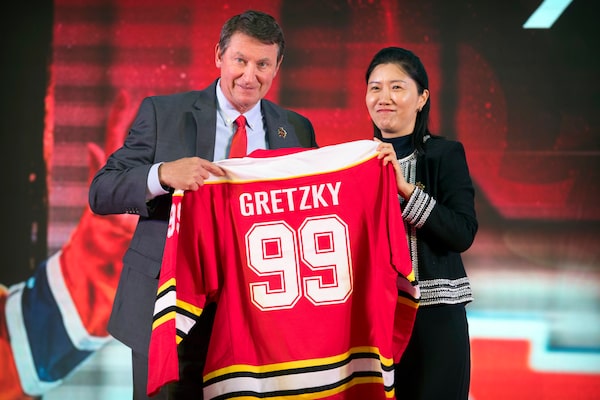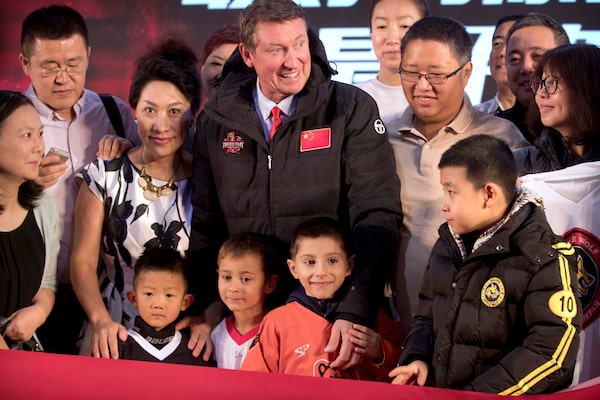
Wayne Gretzky is presented with a Beijing Kunlun Red Star jersey with his name and number during a promotional event in his role as global ambassador for the team, part of the Russia-based Kontinental Hockey League, in Beijing, on Sept. 13, 2018.Mark Schiefelbein/The Associated Press
It was a moment straight out of an advertiser’s pitchbook: The Great One walking near the Great Wall, as hockey tries to make inroads in the world’s most populous country.
Wayne Gretzky’s trip to the famous landmark on Tuesday capped his first trip to China, marking a new chapter in efforts by the sport to grow in a country whose government is promoting winter sports ahead of the Beijing Olympics in 2022.
Heralded as “the Hockey Emperor” when he arrived in Beijing last week, Gretzky was issued a new No. 99 jersey – but not in the familiar colours of the Oilers or the Kings. Instead, it was in the brilliant red of Kunlun Red Star, the KHL team that has sought to expand professional hockey in China.
Though he is barely recognized in China, Gretzky was appointed the club’s global ambassador in August.
The role has added hockey’s most famous name to the list of those hoping to profit from China, as the NHL, the KHL, the Canadian Women’s Hockey League, Ivy League hockey, Canadian private schools, the government of Canada and an array of other interests cast aside competitive instincts in pursuit of a market that has brought new wealth to other sports organizations.
Kunlun has “a vision to grow our sport,” Gretzky said as he spoke to a small crowd on the ice at the Little Wolf Ice Hockey Club. Gretzky has big plans for his personal brand in the country, too, starting with hockey schools – tag line: “Best Hockey Best Education” – then building toward instructional videos and, possibly apparel and other profit centres.
“The sky is the limit for our sport growing in this country,” Gretzky said last Thursday, offering his hopes that “maybe somehow, some way” a Chinese team could become a medal contender by 2022.
Gretzky’s arrival in China coincided with a pair of NHL exhibition games played by the Boston Bruins and Calgary Flames in Shenzhen on the weekend, where the Bruins won 4-3 in a shootout, and Beijing on Wednesday. Gretzky, the vice-chairman of Oilers Entertainment Group, publicly urged the NHL to send its players to the Beijing Olympics in 2022, after the league bowed out of Pyeongchang earlier this year.
But both the NHL and Gretzky’s representatives were quick to dispel any notion that this might represent a conflict.
“Wayne is the consummate ambassador for the game of hockey and we are supportive of all his efforts to help grow the game – anywhere and everywhere,” NHL commissioner Gary Bettman told The Globe and Mail. “Actually, Wayne was going to join us for some of our activities,” he said, but a typhoon interfered with travel in southern China.
What’s good for the KHL in China is also good for the NHL, those who work with Gretzky say.
By coming to China, Gretzky “very much wants to replicate what he did in Los Angeles,” said Scott MacPherson, a former hockey coach and executive with deep ties to the KHL and Kunlun. “Hockey grew exponentially when Gretzky went from Edmonton to L.A. He wants to be part of the same thing here.”

Wayne Gretzky poses for a group photo during a promotional event for the Beijing Kunlun Red Star hockey team in his role as global ambassador for the team, part of the Russia-based Kontinental Hockey League, in Beijing, on Sept. 13, 2018.Mark Schiefelbein/The Associated Press
Gretzky, he added, is “on par with Pele, Muhammad Ali, Jack Nicklaus, Yao Ming.” In China, “we believe that his iconic status will carry through.”
John Cappo, a long-time sports executive in China who has served in senior roles with IMG and AEG, has a different analogy: Gretzky may be a living legend, but so is Deng Yaping, the Chinese table-tennis player who has won 18 world championships, including four Olympic golds.
“Wayne Gretzky developing hockey in China is about as probable as Deng Yaping developing table tennis in the U.S.,” he said. “The Great One is the Great One,” he added. “But I don’t know if he’s going to see this in his lifetime – China becoming a great hockey nation.”
Hockey was not broadcast in China while Gretzky was on skates, and when nearly two dozen Beijing commuters were asked about him on a recent morning, none recognized his name. A photo of Gretzky in his Kings uniform was shown to a half-dozen people, but no one could even identify the sport.
“He looks like a popular politician – he must be a great person who is successful in his field?” guessed Wang Zhuoxian, a man in his 30s.
Gretzky is “not that influential in China,” said Wu Wei, a sports broadcaster who does play-by-play of the NHL on CCTV-5+, the digital sports channel of China’s central state broadcaster.
When Wu mentions “Gretzky” in his television commentary, “the real hockey lovers are very familiar with him. The problem is, the group of real hockey lovers in China is too small,” he said in an interview. Not only did hockey come late to China, he says, but the poor performance of Chinese national teams has constrained domestic interest.
Even the Chinese translation of Gretzky’s name missed a potential opportunity: in Mandarin, he is called “wei en,” using characters with little meaning. “I think it should be ‘wei ren,’ which means ‘great man,’” Mr. Wu said. “But you know, China is a country where politics pervades everything. So ‘great man’ can only be used to describe a national leader.”
Still, Wu said, the broader efforts to promote hockey are having some effect, and “the number of hockey fans is continually increasing.” NHL games regularly count more viewers in China than North America. (The exhibition game in Shenzhen, however, was viewed fewer than 2,500 times on Tencent, the online giant that is the NHL’s strategic partner in China.)
The CWHL has shrunk this year to a single team – fielding two teams last year cost roughly US$20-million; “we didn’t lose it, we invested,” MacPherson said – but for Kunlun Red Star’s KHL team, the flow of corporate sponsorship dollars is sufficiently big that “we’re pretty close to break-even,” he said.
Gretzky’s presence has also galvanized a broader set of hockey ambitions in China. The Canadian government has lent its own support to Kunlun Red Star, in the name of promoting hockey. The Gretzky Hockey School is opening in China, too, with ambitions to train 20,000 teenagers in five years. Toronto’s Blyth Academy has begun scouting locations for full-time elite sport and academic schools in China. It hopes it can open the first, with an initial focus on hockey, in 2020.
”I think you’ll see a substantial Gretzky branding presence in China leading up to the opening of the full-time school,” founding chief executive Sam Blyth said. “Gretzky and the Canada brand that he brings is very timely in China.”
Those who work with Gretzky, meanwhile, point to opportunity in hockey’s low profile. Serving as ambassador for Kunlun Red Star “is more about growing the game – and in turn growing the game helps grow his brand,” said Ira Stahlberger, Gretzky’s agent.
He dismissed a suggestion that it was strange to see the Gretzky name on a Russian league’s jersey.
“Ninety-nine,” he said, “looks good everywhere.”
With reporting by Alexandra Li
 Nathan VanderKlippe
Nathan VanderKlippe